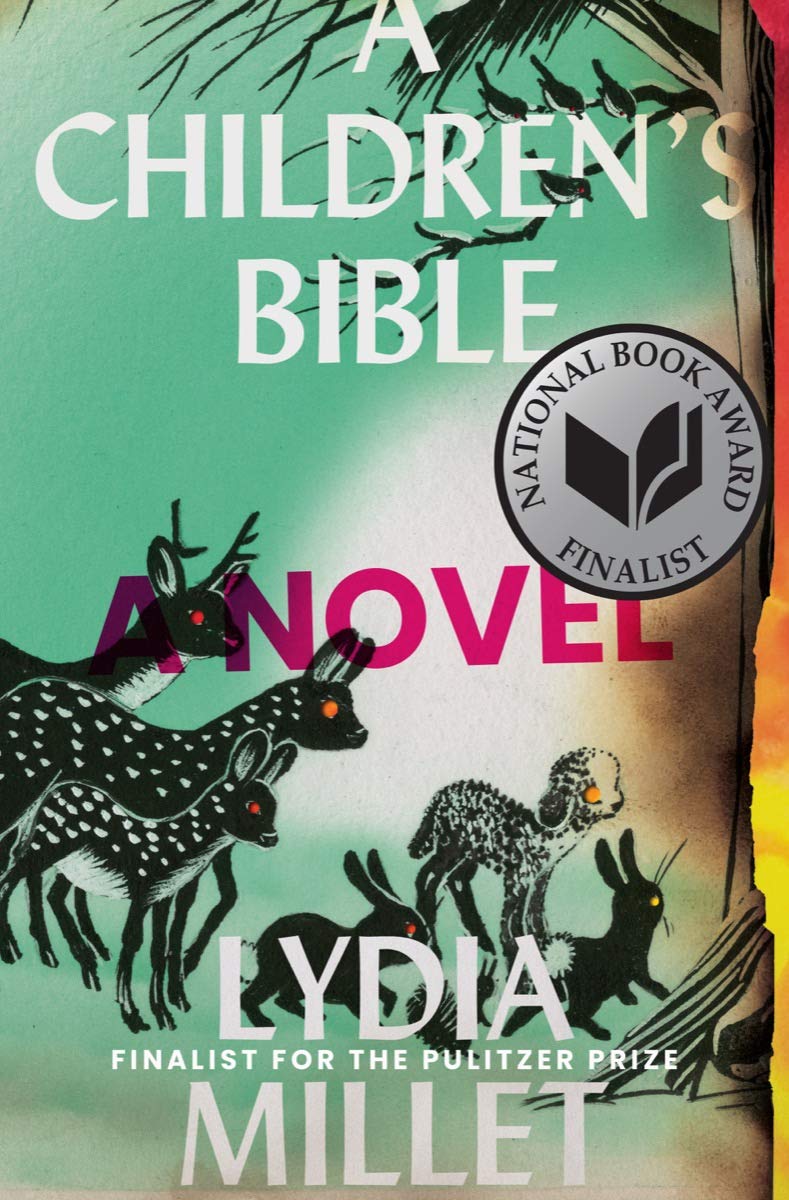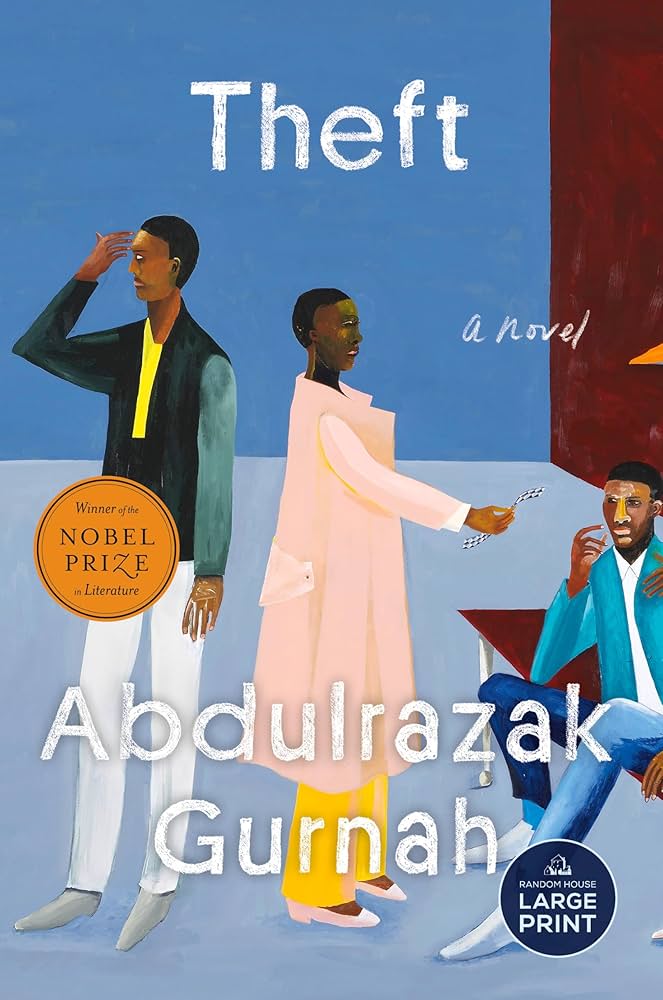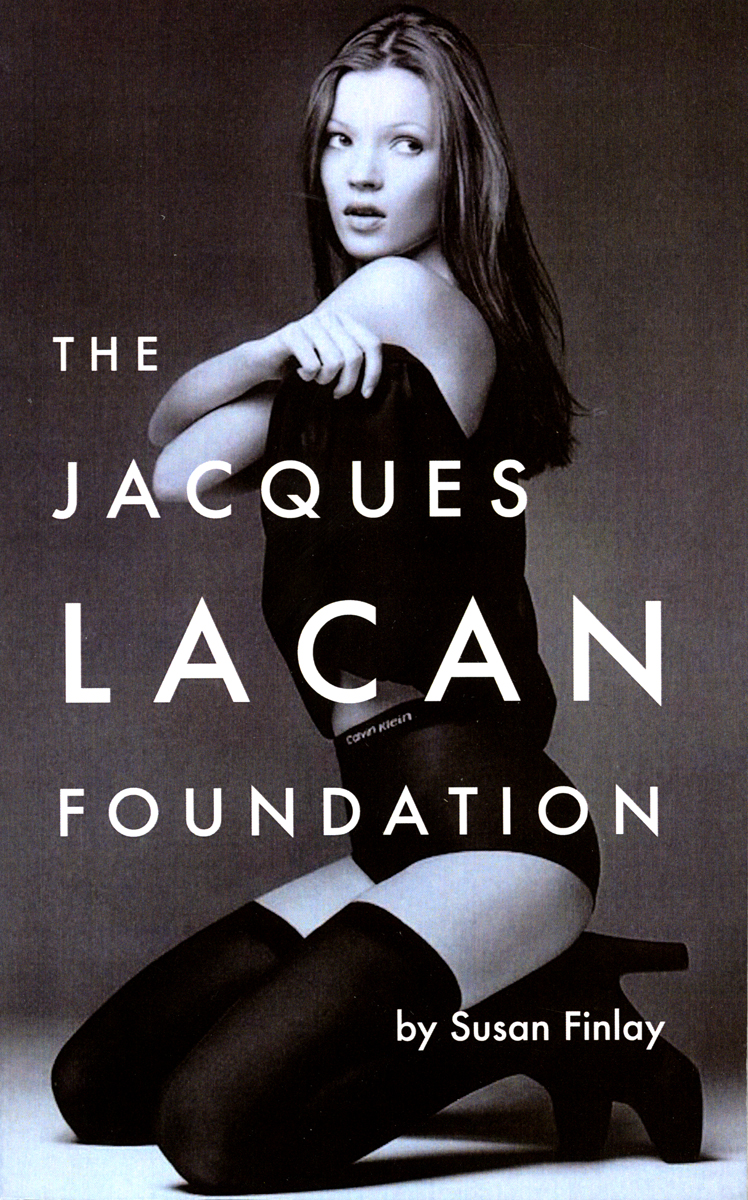Curated by ISABEL MEYERS
Here in Western Massachusetts, the harsh New England winter is gradually thawing, and our greyish snowbanks are melting into puddles. Meanwhile, our interns have returned to their spring semester classes and their work at The Common. This March, we’re hearing what’s propelled them through their long winter break toward a brighter and warmer spring.
Recommendations: The Meursault Investigation by Kamel Daoud, The House in the Cerulean Sea by T. J. Klune, Elizabeth Costello by J. M. Coetzee, A Children’s Bible by Lydia Millet
Kamel Daoud’s The Meursault Investigation; recommended by Whitney Bruno (Editorial Assistant)
At the climax of Albert Camus’s renowned 1942 novella The Stranger, the protagonist—a reclusive, mild-mannered Frenchman named Meursault—murders a nameless man dubbed “The Arab” on a mere whim. The ramifications of Meursault’s crime are not only picked apart in the text itself but are studied in classrooms across the globe. Academics routinely scrutinize Meursault’s actions under the context of philosophical absurdism and nihilism, oft concluding that the novella critiques the human urge to assign meaning to the most meaningless of phenomena—such as a crime committed for no discernable reason.
Kamel Daoud’s 2013 novel The Meursault Investigation turns this narrative on its head. Told from the perspective of Harun, brother of “The Arab” (later revealed to be named Musa) murdered by Meursault, Daoud’s novel exposes The Stranger’s framing of Musa’s dehumanizing death for what it really is: not a grand moment to prompt esoteric philosophical study, but an orientalist fantasy. In a stream-of-consciousness style of narration that mimics Meursault’s, Harun relays his life story to a student who approaches him at a bar. Harun tells the student about how his family’s life in Algeria was permanently altered by the death of his older brother Musa, about how his mother came to resent Harun for being her only surviving son, about his loss of faith, his failed attempts at forming new relationships, and his inner turmoil over Meursault’s self-serving narrative of his brother’s death. Harun exclaims, “Musa’s name! [It was] nowhere to be found. I counted and re-counted, the word ‘Arab’ appeared twenty-five times, but no name, not for any of us. Nothing at all, my friend.” Daoud’s humanization of Camus’s voiceless, Arab characters conveys a clear message: the dismissal of marginalized characters to the point where they’ve become concepts to be antagonized and even murdered taints Camus’s entire narrative in a devastating way.
Daoud’s novel comes in an ongoing wave of post-colonial literature that aims to restore power to those previously caricatured and silenced by colonialist narratives, a phenomenon critiqued by Edward Said in his landmark 1978 book, Orientalism. Using The Meursault Investigation’s commentary on the aftermath of the Algerian War, Daoud invites us to wrestle with what it means to reframe a story, and to bestow a listening ear to perspectives that were previously erased from the mainstream. He writes, “The only shadow [in Meursault’s story] is cast by ‘the Arabs,’ blurred, incongruous objects left over from ‘days gone by,’ like ghosts, with no language.”
T.J. Klune’s The House in the Cerulean Sea; recommended by Elly Hong (Thomas E. Wood ’61 Fellow)
For years, Linus Baker has been a caseworker at the Department in Charge of Magical Youth. Though he’s never quite fit in with its coldly professional culture, he’s determined to do his job well—until a classified assignment from Extremely Upper Management challenges everything he thought he knew about magical children. The people he meets range from a wyvern with a hoard of buttons to a shy shapeshifting boy who’s also a talented writer. They are magical, and they may seem strange, but above all they are children, and they force Linus to confront the apathy with which his department approaches those outside of society’s norms.
At turns whimsical and heart-wrenching, The House in the Cerulean Sea departs from the grimdark stories common in its genre while still doing justice to the experience of systemic prejudice. It’s a beautifully simple story accessible to readers who don’t typically turn to fantasy. Watching Linus grow, learn, and find love brought me comfort during dark times, for Cerulean is a hug disguised as a book.
J. M. Coetzee’s Elizabeth Costello; recommended by Sofia Belimova (Editorial Assistant)
I’d be hard-pressed to identify the genre of J. M. Coetzee’s Elizabeth Costello. On the surface, it’s a fictional narrative about a renowned elderly author who travels to conferences and discusses various literary and philosophical ideas. However, it is also a kind of epistolary piece, a constellation of speeches given by the protagonist and other people around her. Being an extensive allegory and a deep study of humanity, this novel presents us with characters who are simultaneously clashing ideological models and complex human beings trying to understand one another. Finally, Elizabeth Costello is a fascinating essay on various facets of literary creation.
The novel is subdivided into eight lessons on topics such as “The Problem of Evil,” “The Humanities in Africa,” and “The Lives of Animals.” In each chapter, the protagonist Elizabeth Costello goes on a journey to a new place (usually an academic setting), and either listens to or presents her opinion on the chapter’s lesson. For instance, in “The Humanities in Africa,” she travels to a university in Zululand, where her sister Blanche gives a speech about the obsolescence of the humanities and the violent passing of “the monster of reason, mechanical reason.” Blanche is a nun, and Elizabeth reckons with digesting both her inflammatory remarks and other people’s vicious criticism of the speech. However, Elizabeth is no more divine or less human than those around her, and, after a heated luncheon discussion, the two sisters fight over whether humanism can provide the same kind of salvation as Christianity. Ideologically, I found these people’s conversations fascinating, but Coetzee’s ultimate goal is to use these arguments to spark a discussion of aesthetics: towards the end of the chapter, Blanche and Elizabeth quibble about how Christian and Greco-Roman representations and conceptions of the human body mitigate or amplify human suffering in the context of imperialism. It’s a sociocultural thesis borne by memorable personalities and complex perspectives, an essay that gets to inhabit as many voices as it wants to.
While Elizabeth Costello and other characters get to do a lot of things that quarantine precludes us from doing today, such as traveling around the world and attending conferences, this novel bodes well for a time when we are coping with isolation. Like us, Elizabeth Costello exists in solitude, though her loneliness has to do less with travel restrictions and more with being misunderstood. In “Realism,” the first topic of the book, an interviewer for a college radio show pigeonholes Elizabeth’s novel into a call for a post-patriarchal identity, to which she responds by helplessly staring at her son. This pattern, in which Elizabeth as a writer and as a woman is pressured to convey a certain kind of message, renders her incredibly lonely, contained by unmarketable thoughts and ideas she is unable to put into words. I definitely recommend this book to writers looking to challenge traditional formats and explore hybrid forms.
Lydia Millet’s A Children’s Bible; recommended by Olive Amdur (Editorial Assistant)
I finished Lydia Millet’s A Children’s Bible during the third heavy East Coast snowstorm of the season, watching sheets of snow fall outside my living room window. In a year that has, in many ways, been a year of weather—walks when the sun is out and days inside when it rains, all our indoor places suddenly shifted outdoors or shuttered—I am attentive to climate every day in a new way. In this attention, I have found few better places to turn than this book: to its work with disaster, adaptation, and possibility.
A Children’s Bible begins in a mansion near the coast, where old friends from college and their children have assembled for vacation. While the parents drink the days away, enveloped in their lives, the children roam, canoeing the nearby lake, climbing trees, and swimming all the way toward the ocean’s shore. The disasters of the book unfold slowly. There is an early hurricane season, a large storm, flood and winds that threaten the large house, then waterborne disease, impassable roads, and a botched escape to a mansion in Rye that leaves the children living on a mysterious farmhouse compound. Through all this seeping and surreal disaster, Millet’s book takes shape as a story of parents and children, and of what happens in the movement of generations: the transition from apathy to concern, from resignation to a deep, angry, and earth-bound energy.
“At that time in my personal life, I was coming to grips with the end of the world,” Evie, Millet’s narrator, says in the beginning. I’m slightly older than Evie, yet still a young person of the generation told that it is our job to figure out how to save this world—who must. Often, I struggle with my ability to hold Earth’s future in my daily consciousness, and with feelings of frustration that it has been left to us, but I found in this book a strange sense of comfort simply because Millet allows those feelings to coexist. Everything is complicated—intellectuality, art, class, religion, the internet, privilege, power—but the children are allowed to be angry and the parents confused, because it is in this tension, frustration, and collaboration that the book defines and defends hope. That’s what I’ve needed these days.








